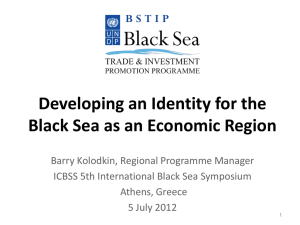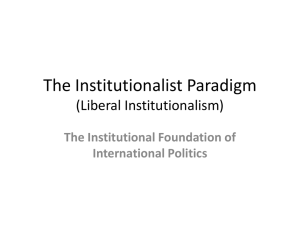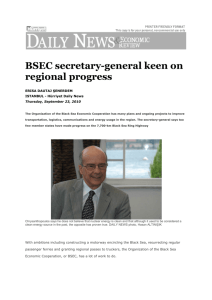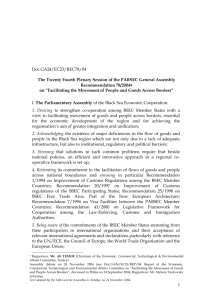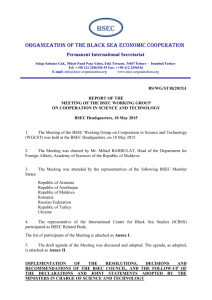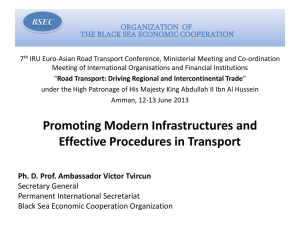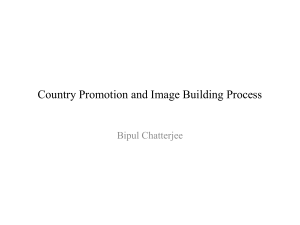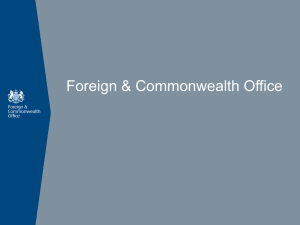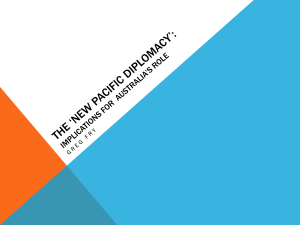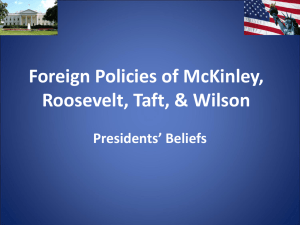Mr. Radu Carp
advertisement
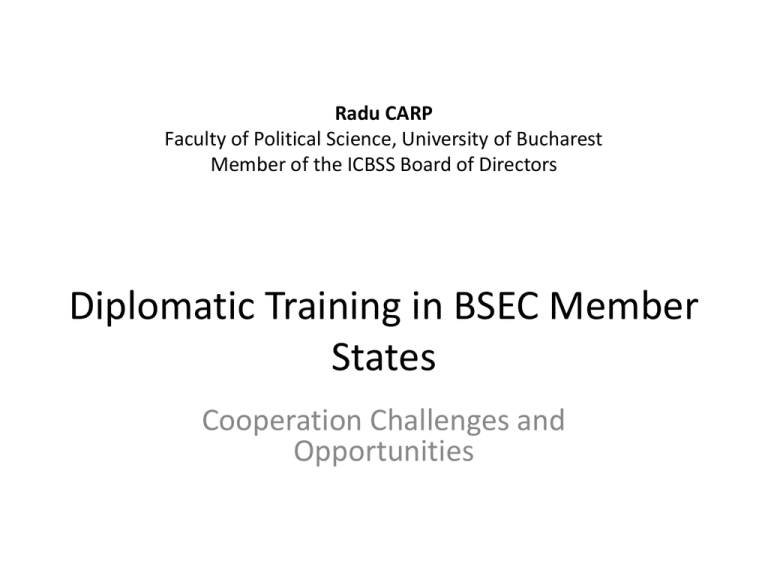
Radu CARP Faculty of Political Science, University of Bucharest Member of the ICBSS Board of Directors Diplomatic Training in BSEC Member States Cooperation Challenges and Opportunities Diplomacy and Diplomats in an Era of Globalization Throughout history, diplomacy has been adapting to the demands arising from changes in the international system. Contemporary diplomacy now includes a focus on human rights, cultural differences, transparency and accountability. New forms of diplomatic activity have taken shape: public diplomacy, cultural diplomacy, paradiplomacy. Public diplomacy is increasingly part of diplomatic training. International relations are now unthinkable without the public diplomacy component. Diplomacy is no longer practiced within the offices of heads of state and foreign ministries. Professional diplomats often use public meetings and the media in order to present the national interests of their countries. An important part of the diplomatic work involves interaction with NGOs, media, trade unions, religious groups, academia, foreign policy institutes. Public diplomacy is also practiced by non-professional diplomats. Journalists, political or religious leaders may well perform the functions of public diplomacy and they need diplomatic training in accordance. Cultural diplomacy refers to the use of creative expression and exchange of ideas, art, lifestyles, values, traditions, beliefs, etc. Cultural diplomacy is often used via cultural institutes, public intellectuals, etc. that also need diplomatic training in order to promote the national interests. Regional or local authorities increasingly have competences in international relations and federal entities may have the power to establish their own diplomatic representations abroad. They are very active especially in the area of cultural diplomacy, in order to promote sub-national identities. Because of these developments, local authorities with competences in international relations also need diplomatic training. We need new kinds of diplomatic training as response to challenges such as: - the changing nature of diplomatic representation; - accountability as a result of greater public awareness; - the increased importance of consular affairs; - strong activism of non-state actors; - new policy networks between MFAs and public/private bodies. A shift in the forms and methods of diplomatic training has already occurred. What is necessary is to increase the efforts to adapt all curricula related to diplomatic training in order to reflect all these new challenges. G. Lindstrom, 2002: “For the diplomat of the 21st century, success hinges on being proficient in a multitude of areas…Besides knowledge of different languages and cultures, they need updated expertise in areas such health, the environment, demographics, and terrorism. They have to know the intricacies surrounding intellectual property rights, dumping, and non – tariff barriers”. The new trends in diplomatic training are: - the engagement of locally employed staff in more areas of the work of posts abroad , staff that require specialised training; - joint training of officials from various ministries, not only MFA, engaged in external affairs; - joint programmes of professional development financed by various EU funds; these programmes receive better financement if they involve more partners that have to deliver a unitary curricula; - new forms of regional cooperation create the need to adapt the curricula of diplomatic training to regional issues. Traditional “in-house” diplomatic training is no longer enough to cope with an effective 21st diplomacy. The expansion of areas of diplomatic training such as crisis management, consular affairs, public diplomacy has been accompanied by a growth of active learning methods –simulations, role-playing exercises, elearning, etc. Practical skills training is being adapted to provide diplomats with new competences they need to be able to perform effectively. Diplomatic training should incorporate the elements of public, business, cultural and media based diplomacy. The increased intensity of international relations has promoted the interaction between bilateral and multilateral negotiations. As a consequence, increased importance is being given to skills of facilitation and coordination as diplomats are ever more likely to share negotiating responsibilities with delegates from other government agencies. Diplomatic training is strongly related to catalytic diplomacy (B. Hocking) that is shaped as a interdependence between actors who enter into bargaining relationships in which key resources - wealth, knowledge and legitimacy - are traded. The task of diplomatic academies and training departments of MFAs is very complex and it involves the continuous adaptation of curricula. In few decades foreign missions will be no longer dominated by the traditional way of political reporting. Diplomats will use new means of communication. The foreign policy will encompass new arenas like technology, health, environment, migrations that will require increased forms of cooperation with experts recruited both from government and private sector. Diplomatic training as a tool of promoting the key role of education at the level of BSEC 2012 is a turning point in the activity of the Organization of the Black Sea Economic Cooperation, 20 years after it has been launched as a regional initiative. It may be considered as a very mature framework of multilateral interaction. Member States are recognizing the importance of BSEC and are proud to be part of this organisation. The original task of BSEC has been to enhance regional cooperation in a specific area where bilateral relations where always based on mutual benefit. We may ask if this goal has been achieved. If we look at the 2001 BSEC Economic Agenda and we compare it with the current state of affairs we may give a rather negative answer. The key issue for BSEC is nowadays how to shape a sustainable relationship with the European Union that has launched and develop initiatives and strategies for the Black Sea area. The main challenge for BSEC is to see if the European Union is a regional actor that enter into collision with his interests or a partner that may develop strong relations with individual BSEC Member States, apart from the ones that are already part of the EU. In the field of education, BSEC is better prepared than other regional initiatives around the globe. Most of the Member States are advanced in the reform of the education and research sector and are integrated into the Bologna process. Sergiu Celac, 2012: “Scholarships and postgraduate or even post-doctoral fellowships in Black Sea studies are now available at leading universities and research centers in several BSEC countries as well as in Western Europe, United States, Japan and China. The body of quality, peer-reviewed publications on subjects related to the Black Sea regionalism has increased considerably and begins to have an impact on policy making” What BSEC could do for enhancing education dimension? - Member States should invite in different programmes (accreditation of universities, doctoral dissertations, Ministry of Education panels, etc.) experts from other Member States; - the Black Sea College as an EU initiative shall be encouraged by all Member States and by an official statement of BSEC; - the role of ICBSS shall be enhanced with voluntary contributions from Member States, to encourage the investment in education ad exchange teaching programmes in the BSEC area, shaped on the model of CEEPUS programmes; - scientific events on Black Sea issues shall be organized, financed by a new special fund, part of the BSEC budget; Diplomatic Training in the BSEC Framework: A Long Road Ahead In 2007 a Memorandum of Understanding has been signed between Diplomatic Academies and Institutes of the MFAs of the Member States of the Organization of Black Sea Economic Cooperation. According to this MoU, BSEC Member States will: - exchange information on their programs, courses, seminars and other academic activities; - exchange information on teaching methods and methodological tools developed and applied in the syllabi; - exchange professors, lecturers, experts and trainees; - organize conferences, specialized training courses or seminars for diplomats and government officials in diplomacy and international affairs. All BSEC Member States are represented in the Executive Board that is presided by the Director of the Diplomatic Academy/Institute of the BSEC Member State exercising the Chairmanship – in – Office. This MoU has been written to be valid for a period of 5 years. It has expired in April 2012 but according to his provisions, it is automatically extended for a further period of 5 years. The MoU is a very useful framework but it has not been put into practice. It is necessary to see how it could be applied and how BSEC Member States shall be convinced to give specific financial resources to this project. It is also necessary to see how all the Diplomatic Academies/Institutes from BSEC Member States shall cooperate with ICBSS and the Black Sea College when this initiative will be functional. Conclusions Education is essential for the development of BSEC Member States and multilateral projects shall be encouraged within the framework of the Organization of BSEC. Diplomatic training is closely linked to education and both are crucial for the sustainable development of BSEC. Diplomatic training is a very advanced and sophisticate tool, in a very close relationship with the work of diplomats. It requires innovative means, significant financial resources, high quality lecturers, very carefully designed curricula. BSEC, as a regional initiative, shall take use of the special relationship with the European Union in order to share good practices, especially in the field of education. As a regional organization, BSEC shall encourage diplomatic training. There is a MoU between Diplomatic Academies/Institutes of BSEC Member States. It is necessary to create a synergy between these institutions, ICBSS and the College of Black Sea.
